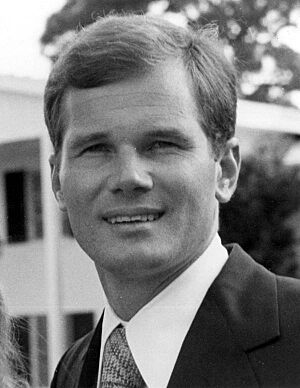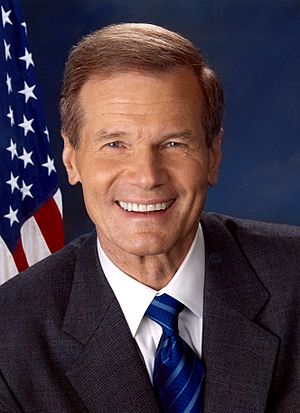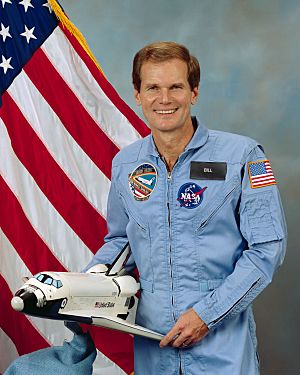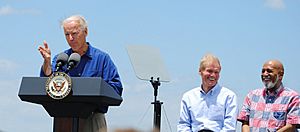Bill Nelson facts for kids
Quick facts for kids
Bill Nelson
|
|||||||||||||||||||||
|---|---|---|---|---|---|---|---|---|---|---|---|---|---|---|---|---|---|---|---|---|---|
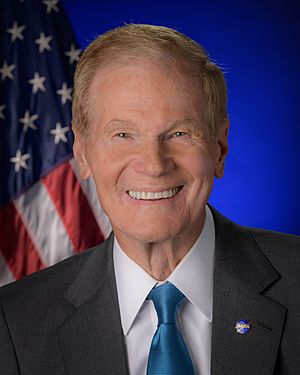
Official portrait, 2021
|
|||||||||||||||||||||
| 14th Administrator of the National Aeronautics and Space Administration | |||||||||||||||||||||
| In office May 3, 2021 – January 20, 2025 |
|||||||||||||||||||||
| President | Joe Biden | ||||||||||||||||||||
| Deputy | Pamela Melroy | ||||||||||||||||||||
| Preceded by | Jim Bridenstine | ||||||||||||||||||||
| Succeeded by | Janet Petro | ||||||||||||||||||||
| United States Senator from Florida |
|||||||||||||||||||||
| In office January 3, 2001 – January 3, 2019 |
|||||||||||||||||||||
| Preceded by | Connie Mack III | ||||||||||||||||||||
| Succeeded by | Rick Scott | ||||||||||||||||||||
|
|||||||||||||||||||||
| 22nd Treasurer of Florida | |||||||||||||||||||||
| In office January 3, 1995 – January 3, 2001 |
|||||||||||||||||||||
| Governor | Lawton Chiles Buddy MacKay Jeb Bush |
||||||||||||||||||||
| Preceded by | Tom Gallagher | ||||||||||||||||||||
| Succeeded by | Tom Gallagher | ||||||||||||||||||||
| Member of the U.S. House of Representatives from Florida |
|||||||||||||||||||||
| In office January 3, 1979 – January 3, 1991 |
|||||||||||||||||||||
| Preceded by | Louis Frey Jr. | ||||||||||||||||||||
| Succeeded by | Jim Bacchus | ||||||||||||||||||||
| Constituency | 9th district (1979–1983) 11th district (1983–1991) |
||||||||||||||||||||
| Member of the Florida House of Representatives from the 47th district |
|||||||||||||||||||||
| In office November 7, 1972 – November 7, 1978 |
|||||||||||||||||||||
| Preceded by | Redistricted | ||||||||||||||||||||
| Succeeded by | Tim Deratany | ||||||||||||||||||||
| Personal details | |||||||||||||||||||||
| Born |
Clarence William Nelson II
September 29, 1942 Miami, Florida, U.S. |
||||||||||||||||||||
| Political party | Democratic | ||||||||||||||||||||
| Spouse |
Grace Cavert
(m. 1972) |
||||||||||||||||||||
| Children | 2 | ||||||||||||||||||||
| Education | |||||||||||||||||||||
| Military service | |||||||||||||||||||||
| Branch/service | United States Army | ||||||||||||||||||||
| Years of service | 1965–1968, 1970–1971 (reserve) 1968–1970 (active) |
||||||||||||||||||||
| Rank | Captain | ||||||||||||||||||||
| Space career | |||||||||||||||||||||
| NASA payload specialist (congressional observer) |
|||||||||||||||||||||
|
Time in space
|
6 days, 2 hours, 3 minutes | ||||||||||||||||||||
| Missions | STS-61-C | ||||||||||||||||||||
|
Mission insignia
|
|||||||||||||||||||||
Bill Nelson (born September 29, 1942) is an American politician and former astronaut. He served as a U.S. Senator for Florida from 2001 to 2019. From 2021 to 2025, he was the head of NASA.
Nelson is a member of the Democratic Party. Before becoming a senator, he was a U.S. Representative from Florida's Space Coast (1979–1991). He also served in the Florida House of Representatives (1972–1978). In January 1986, he became the second person from Congress to fly in space. He was a payload specialist on mission STS-61-C aboard the Space Shuttle Columbia. Before politics, he was in the United States Army Reserve.
After leaving Congress in 1990, Nelson ran for governor of Florida but did not win. He was later elected Treasurer, Insurance Commissioner, and Fire Marshal of Florida, serving from 1995 to 2001. In 2000, he was elected to the U.S. Senate. He was reelected in 2006 and 2012. In 2018, he ran for a fourth term but lost to Rick Scott. In May 2019, Nelson joined NASA's advisory council.
In the U.S. Senate, Nelson was known as a moderate Democrat. He supported same-sex marriage and protecting the Affordable Care Act. He also worked to expand environmental programs.
On March 19, 2021, President Joe Biden chose Nelson to lead NASA. The Senate approved his nomination on April 29. He was sworn in on May 3 by Vice President Kamala Harris. Nelson left NASA on January 20, 2025, when President Biden's first term ended.
Contents
Early Life and Education
Nelson was born in Miami, Florida, on September 29, 1942. He grew up in Melbourne, Florida, and went to Melbourne High School.
He attended the University of Florida for two years. Then he transferred to Yale University, where he earned a degree in political science in 1965. He later received a law degree from the University of Virginia in 1968.
In 1965, during the Vietnam War, Nelson joined the United States Army Reserve. He served on active duty from 1968 to 1970. He reached the rank of Captain. He left the Army in 1971.
Space Shuttle Columbia Mission
In 1986, Bill Nelson became the second person from Congress to fly into space. He trained with Senator Jake Garn, who flew in 1985. Nelson was a payload specialist on the STS-61-C mission. This mission took place from January 12 to 18, 1986.
The pilot for STS-61-C was Charles Bolden, who later also became a NASA administrator. Another astronaut, Gregory Jarvis, was supposed to be on this flight. But he was moved to STS-51-L. Sadly, Jarvis and six others died in the Space Shuttle Challenger disaster ten days after Nelson's mission ended.
In 1988, Nelson wrote a book about his space journey. It was called Mission: An American Congressman's Voyage to Space.
Early Political Career
Florida Legislature
In 1972, Nelson was elected to the Florida House of Representatives. He represented parts of Brevard, Orange, and Seminole counties. He was reelected in 1974 and 1976.
U.S. House of Representatives
Nelson was elected to the U.S. House of Representatives in 1978. He represented Florida's 9th congressional district. He was reelected several times. His district included Cape Canaveral and its space facility.
He led the House Space Subcommittee for six years. This made him a key member of the House Committee on Science, Space and Technology.
Treasurer of Florida
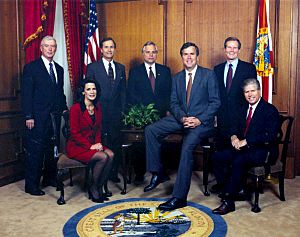
In 1994, Nelson ran for Treasurer, Insurance Commissioner, and Fire Marshal of Florida. He won the election. He was reelected in 1998.
In 2000, Nelson decided to run for the United States Senate. He resigned from his Treasurer role in early 2000 to campaign. His resignation became official on January 3, 2001.
United States Senate
Senate Elections
In 2000, Nelson ran for the U.S. Senate as a Democrat. He won the election, defeating Bill McCollum.
In 2006, Nelson was reelected. He won with a large number of votes. He was seen as a moderate who could work with both parties.
In 2012, Nelson won reelection again. He defeated Connie Mack IV.
In 2018, Nelson ran for a fourth term. He faced Florida Governor Rick Scott. The election was very close. After a recount, Scott won by a small number of votes.
Committee Work
Nelson served on several important committees in the Senate. These included:
- The Committee on Armed Services
- The Committee on Commerce, Science, and Transportation
- The Committee on Finance
- The Special Committee on Aging
He led the Subcommittee on Science and Space. He also served as the top Democrat on the Senate Commerce Committee.
Post-Senate Activities
On May 28, 2019, Nelson was asked to join NASA's advisory council. This council gives advice on major programs and policies at NASA. NASA Administrator Jim Bridenstine praised Nelson's appointment. He said Nelson was a "true champion for human spaceflight."
Nelson supported Joe Biden for President in the 2020 election.
NASA Administrator
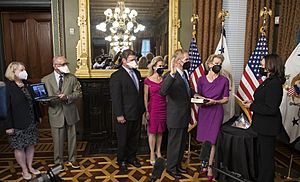
Nomination and Role
On February 22, 2021, news came out that President Biden was thinking of nominating Nelson to lead NASA. On March 18, it was confirmed that Biden had chosen him. The Senate approved Nelson's nomination on April 29. He was sworn in on May 3 by Vice President Kamala Harris.
Biden chose former Space Shuttle commanders Pamela Melroy and Robert D. Cabana to help Nelson. Melroy became Deputy Administrator.
Nelson became a strong supporter of using private companies for space contracts. He believed that competition would make things cheaper. He also supported the Artemis program. This program aims to send humans back to the Moon.
As NASA administrator, Nelson oversaw several big projects. These included the launch of the James Webb Space Telescope. He also oversaw the Artemis 1 mission, which sent an uncrewed spacecraft around the Moon. Another project was the DART mission, which crashed a spacecraft into an asteroid.
Political Views
Nelson was often seen as a moderate Democrat. He described himself as a centrist during his campaigns.
Economic Issues
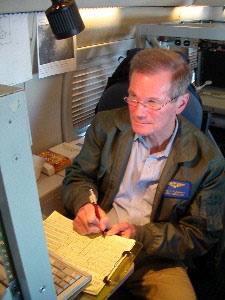
Nelson supported extending tax cuts for middle and lower-income families. He voted for the Buffett Rule in 2012. This rule would have raised the minimum tax rate for people earning over $1 million per year. He believed it would help reduce the budget deficit and make taxes fairer.
He voted for the American Recovery and Reinvestment Act of 2009. This was a plan to boost the economy.
Nelson was interested in product safety. He often checked on the U.S. Consumer Product Safety Commission.
He voted for a law in 2012 that required the National Flood Insurance Program to raise rates for some high-risk properties. This was to help the program stay financially stable.
Space Exploration and NASA
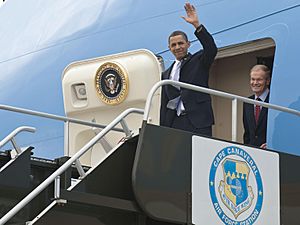
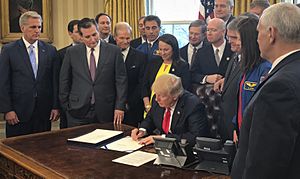
In 2010, Nelson was concerned when President Obama canceled NASA's Constellation program. He wanted NASA to develop a powerful rocket. This led to the creation of the Space Launch System (SLS).
In 2016, Nelson helped create a deal to stop importing Russian RD-180 rocket engines.
During his own confirmation hearing in 2021, Nelson changed his earlier views. He praised the use of private companies in space. He also said that a NASA administrator did not need a science or engineering degree.
In June 2021, Nelson spoke about cooperation between the U.S. and Russia in space. He said, "Your politics can be hitting heads on Earth, while you are cooperating" in space.
LGBT Rights
In 2010, Nelson voted to end the "Don't Ask, Don't Tell" policy. This policy prevented gay and lesbian people from serving openly in the military.
In 2013, Nelson announced his support for same-sex marriage. He said, "The civil rights and responsibilities for one must pertain to all."
Gun Control
Nelson supported new gun control laws. These included a ban on assault weapons. He also wanted a ban on magazines that hold more than ten rounds. He supported requiring universal background checks for gun sales at gun shows.
After the 2016 Pulse nightclub shooting in Orlando, Nelson expressed sadness that certain gun control bills did not pass. He said, "Sadly, what I am going to have to tell them is that the NRA won again."
In 2017, after the Las Vegas shooting, Nelson supported a bill to ban bump stocks for assault weapons. He said, "These automatic weapons are not for hunting, they are for killing."
Environment
Nelson supported banning oil drilling off Florida's Gulf Coast. He wanted this ban to continue until 2027. He argued that drilling would harm Florida's tourism economy. It would also interfere with military training in the area.
In 2011, Nelson helped create the RESTORE Act. This law directed money from BP fines to states affected by the Deepwater Horizon oil spill.
In 2015, Nelson introduced an amendment to stop federal agencies from censoring information about climate change.
Hurricanes
After Hurricane Maria in 2017, Nelson and Marco Rubio agreed that President Trump was too slow to send military help to Puerto Rico. Nelson said the U.S. military is the best organization for disaster relief.
Personal Life
In 1972, Bill Nelson married Grace Cavert. They have two adult children, Charles William "Bill Jr." Nelson and Nan Ellen Nelson.
Images for kids
-
Governor Jeb Bush and Nelson in 1999
-
Nelson with Vice President Joe Biden and Rep. Alcee Hastings in Miami-Dade County, Florida (2012)
-
Nelson works with government storm trackers during a hurricane-hunter flight into the center of Hurricane Charley in August 2004
-
President Barack Obama and Nelson visit Kennedy Space Center in April 2010
-
Nelson looks on as President Donald Trump signs the NASA Transition Authorization Act of 2017
-
Nelson is sworn in as the 14th NASA administrator by Vice President Kamala Harris
See also
 In Spanish: Bill Nelson para niños
In Spanish: Bill Nelson para niños


